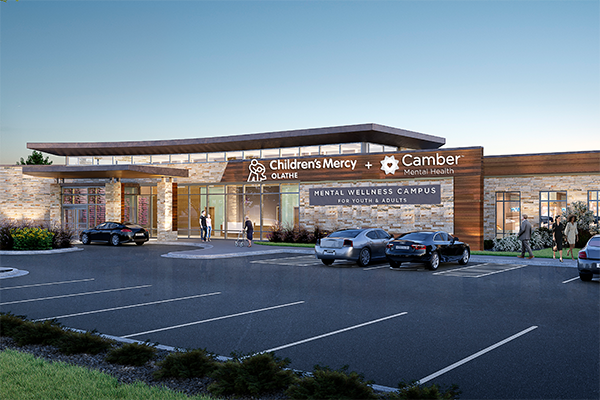- Locations
- How We Help
Overview
As the regional leader in youth mental health treatment, our innovative services help youth achieve health and wellness.
Treatment Programs
- Admissions
Overview
Learn how to admit your child to a Camber treatment location or make a client referral.
- Youth Disorders
- Resources
Overview
Our free resources help you stay informed and educated about mental health, brain development, and childhood trauma as well as how Camber is working toward building healthier communities.
- About Us
Overview
Our philosophy is to provide collaborative, compassionate and effective care through the use of timely, individualized treatment planning.
Learn More About Us
Suicide Prevention
If you or someone you know is considering suicide, call the 988 Suicide and Crisis Lifeline at 988 or chat live at 988lifeline.org. If you’re in Kansas or Missouri, you can also call Camber at 913-890-7468 to find children’s mental health treatment near you.
According to the American Foundation for Suicide Prevention, more than 45,979 people died by suicide in 2020. That’s nearly 1 person every 11 minutes. Suicide has become a major public health issue and families across the United States are in crisis as suicide has become the second leading cause of death for people aged 10 to 34.
Youth Suicide

Over the last several years the number of children and teens struggling with suicidal thoughts, suicide attempts, or another mental illness has been consistently growing at alarming rates. Those trends are likely being further exacerbated as youth struggle to cope with the effects of the COVID pandemic, economic crisis, racial injustice, climate change, political divide, fears over school shootings, and more.
The Centers for Disease Control and Prevention (the CDC) published a report in September 2020 showing that the suicide rate among people in the U.S. aged 10 to 24 increased 57.4% from 2007 to 2018. There was a significant increase across 42 states, with Kansas and Missouri being among the states with the highest increase.
Another report shares that in 2020 there was a 31% increase in mental health-related visits to emergency departments for 12 to 17-year-olds.
All of these factors create an immediate need for families to know the warning signs associated with suicidal thoughts and to know how to access treatment when a child is experiencing a mental health emergency.
Watch this video and keep reading below for education about suicidal ideation warning signs & how to help someone in crisis.
Suicide Misconceptions
There is a common belief that someone who thinks about or attempts suicide has a mental health disorder. However, in 2016, more than half (54%) of people who died by suicide did not have a known mental health condition. Also, there is rarely one single factor that causes someone to consider suicide. Some of the issues that can contribute to suicide include substance use, trauma, untreated mental illness, physical health, financial stress, legal issues, housing, relationships and more.
Know the Risk Factors
Below is a list of factors that may indicate an increased risk of suicidal thoughts or attempts in youth.
- Prior suicide attempt(s)
- Family history of suicide
- Experiencing trauma (such as abuse, neglect, the death of a loved one, bullying, and more)
- Family history of mental illness, depression, alcohol and/or drug misuse
- Chronic pain or physical medical conditions
- Substance misuse
- Mood disorders
Know the Warning Signs
Below is a list of warning signs that may indicate someone is actively struggling with thoughts of suicide. These warning signs can be verbal or something displayed through a person’s behaviors.
Talking about:
- Killing themselves
- Wanting to die
- Feeling hopeless or worthless
- Feeling like they have no purpose in life
- Unexplainable and/or unbearable pain
- Feeling like there’s no point to life
Behaviors:
- Drastic changes in behavior, such as struggling with depression but suddenly displaying a surge of happiness or eagerness
- Increased alcohol and/or drug use
- Changes in sleeping and/or eating habits
- Withdrawn from family, friends and/or activities
- Displaying changes in their mood, such as increased anxiousness, anger or other extreme mood changes
- Engaging in risky behavior or activities
Preventative Steps
There are many preventative steps you can take to help a child or teen before they are in crisis. Here are some examples:
- Tell them that they matter. Positive reinforcement is important.
- Help them engage positive supports in their life (such as school, church, sports or volunteering)
- Create opportunities for them to talk about their emotions. Actively listen.
- Teach them healthy habits for caring for their body and brain.
- Work with them on stress tolerance and coping skills.
- Encourage counseling; you don’t have to be in crisis to seek help.
How to Help a Child Who Is Struggling
If you know a child or teen struggling with suicidal thoughts, depression or other mental health needs, seek professional help immediately. Their suffering won’t go away on its own or pass with time.
There isn’t a “one size fits all” with treatment and children’s needs. Here are some steps you can take to find a youth the help that best fits their individual needs:
- Call Camber, previously KVC Hospitals, at 913-890-7468. We’re available 24/7 to answer your questions. Click here to see our locations.
- Speak with their primary care physician or local community mental health center
- Call the 988 Suicide and Crisis Lifeline at 988
Here are some Camber resources to help you understand and address suicide:
- Make an emotion regulation plan to identify triggers and healthy coping skills for when emotions become overwhelming
- LGBTQIA+ youth are statistically more likely to consider suicide, use these resources to support their mental wellness
- Take this quick assessment to determine if your child might be struggling with depression
- Understand common mental health warning signs to watch out for
- Use these easy deep breathing techniques when feeling overwhelmed [VIDEO]
- Deconstruct myths surrounding teen suicide
- Practice these simple yoga stretches to release stress [VIDEO]
- Learn what to expect when admitting a child to a mental health hospital for professional treatment
Here’s a list of additional resources you can contact for help:
- Visit the Anxiety & Depression Association of America website at adaa.org
- Visit a local hospital or emergency department and ask for a consultation
- Call the National Alliance on Mental Illness helpline at 800-950-6264 or visit their website at nami.org
- Learn more about youth suicidal ideation from the Child Mind Institute
Share this information with your support system! View and download this information as a PDF.




